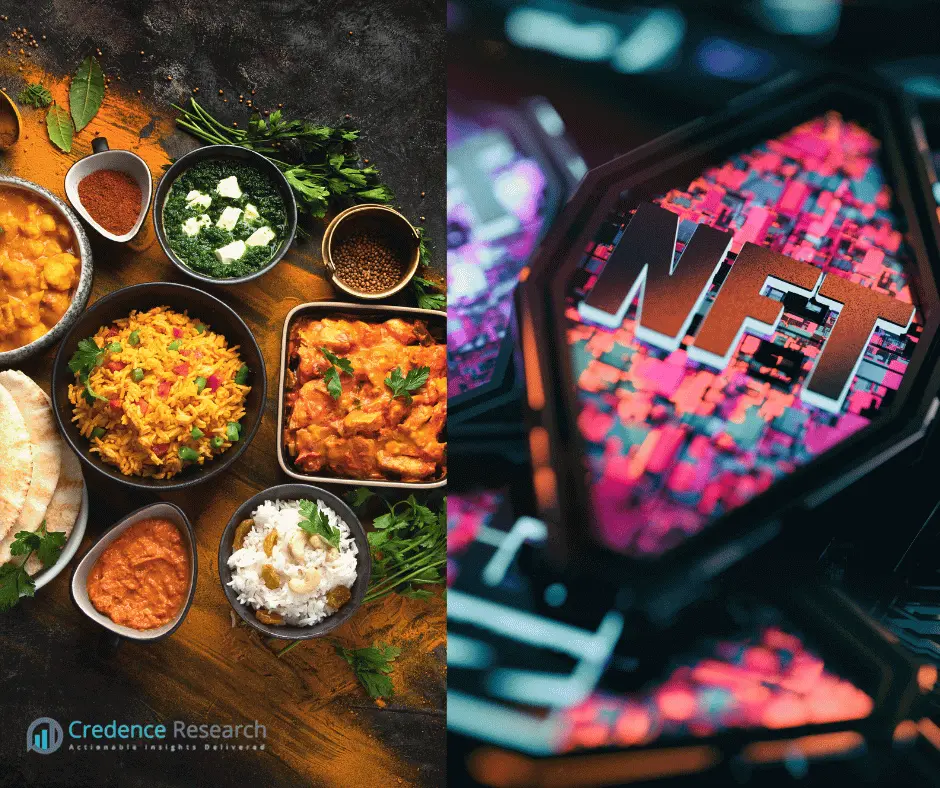“Global Food NFT Market: Growth, Outlook, and Competitive Analysis, 2018 – 2030” is the most recent market study released by Credence Research, Inc. The global food NFT market had revenue of about USD 152.6 million in 2022, and it is predicted that it will increase at a CAGR of more than 42.50% from 2018 to 2030, reaching about USD 1820.8 million.
Market Overview
The blockchain technology and food industries are combined in the relatively new and developing market known as the food NFT. Even though the market is still young, it has expanded steadily as more food-related NFTs are being developed and traded. The expanding interest in food culture and culinary experiences is one of the major factors driving the food NFT business. A new way to interact with and gather food-related content is provided by the food NFT market, which caters to consumers’ growing desire for distinctive and individualized eating experiences.
The food NFT market is also being driven by the expanding use of blockchain technology in the food industry. Blockchain technology can be used to monitor the provenance and legitimacy of food products, which is important for pricey or high-end food items. Although in recent decades, there has been a significant growth in the market for digital collectibles, with people buying and trading everything from digital art to virtual real estate. The food NFT market offers a brand-new class of digital collectibles that places a big focus on food-related content. Like any market in development, there are also regulatory factors. Because blockchain and NFTs in the food industry are still relatively new, there may be regulatory and legal challenges to surmount. Due to the fact that blockchain and NFTs are still relatively new to the food industry, there may be legal and regulatory challenges to surmount. A niche collection of food enthusiasts and collectors may find the market for food NFT to be their main attraction. This may result in a smaller market overall and make it more difficult for new businesses to enter the industry.
Company Profile
- YellowHeart, LLC.
Non-fungible tokens (NFTs) are used by YellowHeart, LLC, a blockchain-based ticketing and event management platform, to instill a new level of openness and trust in the ticketing sector. By developing a safe and decentralized ticketing network, YellowHeart, founded in 2018, hopes to address the issue of ticket fraud and scalping issues. The platform from YellowHeart enables event planners to design, distribute, and market NFT-based tickets for their events. With YellowHeart’s platform, one may produce and market NFTs representing distinctive food products or experiences, such as exclusive dining opportunities, rare ingredients, or limited-edition recipes. To guarantee the legitimacy and ownership of the food item or experience, each NFT might be connected to a distinct digital wallet.
- Cloudflare, Inc.
Internet security, performance, and dependability services are offered by the American technology firm Cloudflare, Inc. The company, founded in 2009, provides various cloud-based solutions to safeguard websites, applications, and APIs against cyberattacks while enhancing their speed and availability. The knowledge of internet security and performance that Cloudflare has, as well as its investigation of blockchain technology, may be useful in the NFT market for food. To create, verify, and trade NFTs related to food, for instance, the company may provide trustworthy and secure blockchain-based solutions. As a result, the market for food NFTs might expand and prosper by addressing some of the technical obstacles and security issues related to it.
- PLBY Group, Inc.
PLBY Group, Inc., a lifestyle business, manages several consumer brands across several sectors, including fashion, entertainment, and wellness. The company’s flagship brand, Playboy, which offers a variety of goods and services, including publications, apparel, events, and more, is the one for which it is best known. PLBY Group does not work in the food sector directly, but it may be able to apply its knowledge of branding and consumer marketing to the NFT market for food. The company has a devoted fan base and a strong brand identity that might be used to develop food-related NFTs that appeal to its target market.
- Dolphin Entertainment, Inc.
Dolphin Entertainment, Inc. is a marketing and production firm established in the United States that specializes in producing entertainment content and experiences for various platforms, including live events, film, television, and digital media. Talent management, branding, marketing, and production are among the services offered by the business. The entertainment business is Dolphin Entertainment’s primary area of concentration, but the food NFT market might benefit from its skill in marketing and producing memorable experiences. The business might collaborate with chefs and food producers to develop NFTs that provide distinctive and upscale dining experiences, such as private chef dinners, cooking classes, or behind-the-scenes tours of food manufacturing facilities.
- Funko
A U.S.-based firm, Funko produces licensed pop culture memorabilia like vinyl figures, bobbleheads, and other goods. Disney, Marvel, Star Wars, and many other well-known companies are just a few of the business collaborations. Funko’s skill in producing limited edition and unique things could be used in the food NFT sector, despite the company’s core concentration on producing pop culture collectibles. The business might collaborate with food producers and chefs to generate limited-edition NFTs highlighting distinctive and exclusive foods or dining experiences. These food-related NFTs might be marketed to the Funko collectors, who are renowned for being prepared to pay a premium for rare and unusual things.
- Ozone Networks, Inc.
Blockchain-based solutions are offered by Ozone Networks, Inc., a technology firm, for several industries, including the food and beverage sector. They focus on producing non-fungible tokens (NFTs) for food goods, which can assist in increasing the traceability and transparency of the supply chain. The creation of distinctive digital assets that represent particular food items or ingredients falls within the umbrella of the relatively nascent NFT industry for food. These NFTs can be purchased, sold, and traded like other cryptocurrencies. However, they also offer useful details about the place of origin and the food’s quality.
- Takung Art Co., Ltd.
Takung Art Co., Ltd. is a Hong Kong-based business that focuses on developing a blockchain-based marketplace for buying and selling collectibles and works of art. Although they might not be directly active in the food NFT market, their knowledge of blockchain-based markets may be used in other sectors, such as the food and beverage industry. As noted, the food NFT industry entails developing distinctive digital assets representing certain food items or ingredients. These NFTs can enhance the food supply chain’s traceability, transparency, and confidence. It’s feasible that Takung Art Co., Ltd. or other businesses with comparable experience in blockchain technology and marketplaces will get involved in this developing sector as the food NFT market continues to develop and gain popularity.
- Dapper Labs, Inc.
The Canadian blockchain technology startup Dapper Labs, Inc. is most known for developing CryptoKitties, one of the first games built on blockchain to become widely popular. Since then, Dapper Labs has broadened the scope of its work to include creating other blockchain-based tools and applications, such as NBA Top Shot, a marketplace for purchasing and selling licensed NBA collectibles in the form of NFTs, officially. Dapper Labs doesn’t directly operate in the food NFT business. Still, their expertise in building blockchain-based marketplaces and applications might be used in various sectors, including the food and beverage industry.
- Gemini Trust Company, LLC.
Cameron and Tyler Winklevoss established Gemini Trust Company, LLC in 2014 as a cryptocurrency exchange and custodian. The New York State Department of Financial Services, which is located in New York City, oversees the organization. Although Gemini Trust Company has no direct engagement in the food NFT business, its knowledge of bitcoin trading and security might be used in various markets, such as the food and beverage sector. In the food NFT sector, distinctive digital assets are made to represent particular food items or ingredients. These NFTs can increase supply chain trust, transparency, and traceability.










